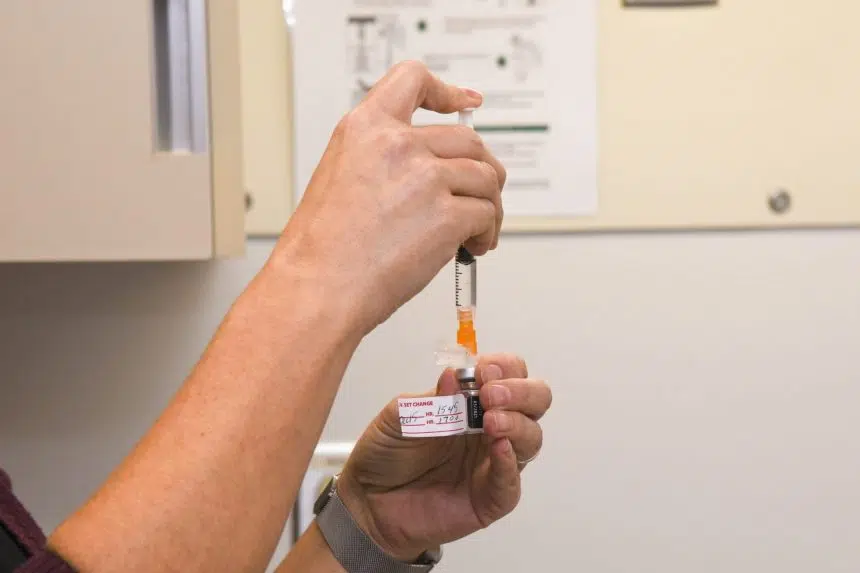There’s a lot going on when it comes to COVID-19 vaccinations in the province.
The age eligibility is about to be lowered to 12 and up on Thursday, and second doses currently are being offered around the province to anyone over the age of 85.
Dr. Joseph Blondeau, a microbiologist with the University of Saskatchewan, discussed vaccine hesitancy with Gormley on Wednesday.
He says as more people get vaccinated in the province, it’s important for parents to have conversations with their kids about vaccines.
“Even with children — who seem to be less affected by COVID-19 — the strategy to move the vaccine into the pediatric population has been described by a number of my colleagues as a win-win scenario for everybody, including that small percentage of children who do get infected with this particular virus and some who actually have serious infections,” Blondeau said.
“The vaccine is doing what it’s supposed to do. It’s working. So the more of us that get vaccinated, then the quicker we get up to this sort of magical number associated with herd immunity.”
Derek Miller, the chief of the Saskatchewan Health Authority’s (SHA) Emergency Operations Centre, says the plan is to offer the Pfizer vaccine to students aged 12 to 17 at schools in the province starting in June.
“Our teams are working with school divisions and individual schools right now in order to put together the plans for when and where those those vaccine clinics will be delivered in schools,” Miller told Gormley.
“It is somewhat similar to earlier in the campaign where we brought the vaccine to every long-term care facility and personal care home in the province.”
When it comes to consenting to vaccines, schools will be providing a package to guardians that will provide things such as a consent form which they can choose to sign as well as an information sheet for the Pfizer vaccine.
In a situation when someone in school wants to get vaccinated without a guardian’s consent, they will possibly be able to do so.
“We do have a mature minor process where an individual who is 13 to 17 can make their own decision about getting the vaccine,” Miller said. “That’s consistent with every other vaccine plan that we have in Saskatchewan.
“There may be exceptional cases where a child doesn’t have a consent form completed, or that they would be providing their own consent as part of that. It would be the health-care worker that would need to make a determination that the minor understand the risks and benefits of the vaccine before they would accept the consent and provide the vaccination.”
As for second doses for people in the province, there are still questions about giving a different vaccine to those who received AstraZeneca the first time around.
Miller says how many AstraZeneca shots will be coming into the province and when that will happen remain a mystery.
“We don’t have any confirmation on what AstraZeneca will look like beyond what we have in the fridge right now, although we certainly plan based on on the premise that we will receive it,” Miller said.
“We’re waiting for information about the potential to mix the second doses for those that received AstraZeneca for the first dose.”
Infectious disease physician Dr. Alex Wong believes people who received an initial dose of the AstraZeneca vaccine should be allowed to choose which vaccine they receive for their second.
“I think both are going to be great options in the end. So again, we’re not choosing between the lesser of two evils. We’re choosing between the better of two great options,” Wong said during the Greg Morgan Morning Show on Wednesday.
The practice of mixing vaccines has gained widespread interest recently, partly due to the limited supply of AstraZeneca doses.
Wong said preliminary data from a U.K. study found those who had an initial shot of AstraZeneca followed up by a dose of Pfizer had more non-serious side effects.
While some hope those results are signs of a stronger immune response, the jury is still out.
“We don’t have any data around what the antibody levels look like,” Wong said.
However, a different study in Spain suggests following up AstraZeneca with a Pfizer shot eight to 12 weeks after the first shot results in what Wong describes as a “robust antibody response.”
“Based on historical levels, it was about twice as high as people that actually got AstraZeneca twice,” he said. “So there’s some preliminary data that would suggest, at least with antibodies, that mixing and matching is reasonable.”
Miller says despite the question marks regarding AstraZeneca doses coming into the province, he believes the province could reach new record highs when it comes to daily vaccinations.
“From a capacity perspective, our limitation has always been and I’m sure will continue to be the number of doses that we receive,” he said. “We built a significant amount of capacity in the province and this has just recently been supplemented by the pharmacies across many sites and communities in the province.
“We definitely have capacity to deliver over that 20,000 doses a day.”
— With files from 980 CJME’s Joseph Ho











